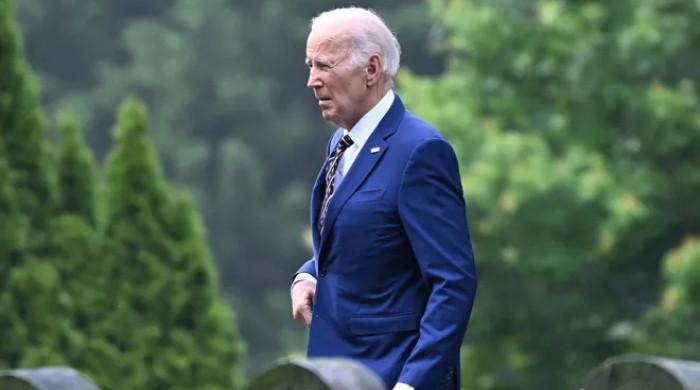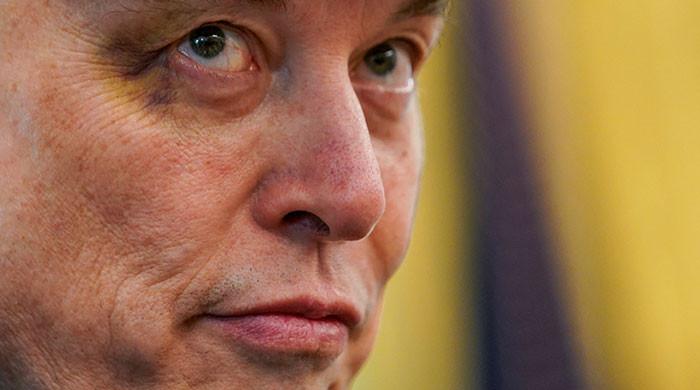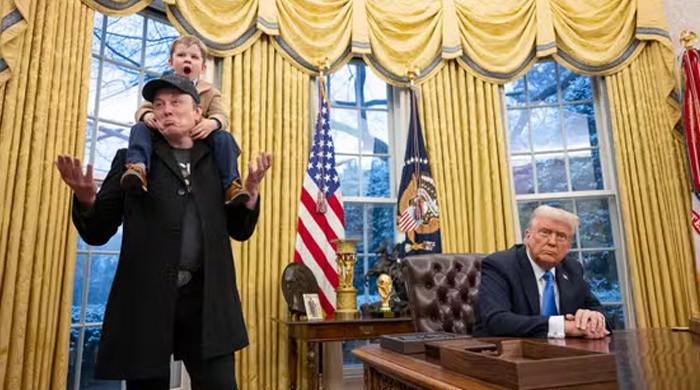Pakistan happy to support SCO efforts for peaceful Afghanistan: PM Abbasi
Objective of this format should be to support Afghanistan's efforts for a peaceful political settlement through dialogue and combatting security and terrorism threats, says PM in Sochi
December 01, 2017
SOCHI: Prime Minister Shahid Khaqan Abbasi, speaking at the 16th meeting of the Shanghai Cooperation Organization's (SCO) Council of the Heads of Government (CHG), on Friday said Pakistan will be happy to contribute to SCO's efforts towards building a stable and secure Afghanistan.
Abbasi's made the statement after calling for further deepening of cooperation within the new consultative format of SCO Afghanistan contact group.
"The objective of this format should be to support Afghanistan's efforts for a peaceful political settlement through dialogue and combatting security and terrorism threats to Afghanistan and the region."
He also highlighted ways in which to strengthen the SCO further. The premier suggested that improving regional infrastructure for enhanced connectivity between member nations.
"Developing multi-lateral trading systems in sync with the WTO to pursue the shared goal of economic trade, services and technological integration," was also suggested by Abassi.
The prime minister further said that harmonising laws and regulations for trade practices, movement of merchandise and custom rules will facilitate better trade among partners.
He also called for better cooperation between member nations in matters relating to justice and suggested there should be regular contact between justice ministries and parliamentarians.
Abassi also called for the fast-tracking of the SCO development bank and development fund.
"Today we are witnessing a historic opportunity for the SCO to truly have a trans-continental reach," said the prime minister.
He added that the organisation will emerge in the coming decades as a major geopolitical and geoeconomic force.
Abbasi congratulated China for taking over the chairmanship of the organisation and welcomed Tajikistan as the host for next year's conference.
Earlier, Pakistan and Russia agreed to forge a long-term, multidimensional partnership during a bilateral meeting between the two countries respective prime ministers.
PM Abbasi and Medvedev expressed satisfaction at the positive trajectory of bilateral relations — specifically the progress made at the 5th Meeting of Pakistan-Russia Inter-Governmental Commission (IGC) held in Moscow from November 28-30, 2017 — and agreed to further deepen cooperation in all fields of mutual interest.
The premier had underscored the immense potential for further cooperation between the two nations in the field of energy and said Pakistan put on priority its relations with the Russian Federation.
The leaders had also expressed confidence that the discussions held between the delegations of the two sides at the IGC would lead to further deepening of cooperation in the fields of trade, energy, education, science and technology, industry, and transport.
Both leaders exchanged views on the regional situation. They agreed on the need to continue efforts to promote peace and reconciliation in Afghanistan.
The two prime ministers underlined the importance of cooperating closely for promoting peace and stability in the region.
PM Abbasi arrived in Russia earlier on Thursday to participate in the SCO Council of the Heads of Government (CHG) — being held from November 30 to December 1.
SCO CHG members
This is the first meeting of the SCO's heads of governments which Pakistan is participating as a full member, having assumed the position back in June, this year.
At present, the SCO comprises eight member states (Pakistan, China, Russia, India, Kazakhstan, Kyrgyzstan, Tajikistan, and Uzbekistan), four observer nations (Iran, Afghanistan, Belarus, and Mongolia), and six dialogue partners (Armenia, Azerbaijan, Cambodia, Nepal, Sri Lanka, and Turkey).
Through its objectives, the SCO hopes to build mutual trust, equality, respect for cultural diversity, and good-neighbourly relations, and aims to promote effective cooperation in political, security, trade-related, economic, and social areas.
The SCO's Regional Anti-Terrorist Structure contributes towards regional peace, security, and stability.











